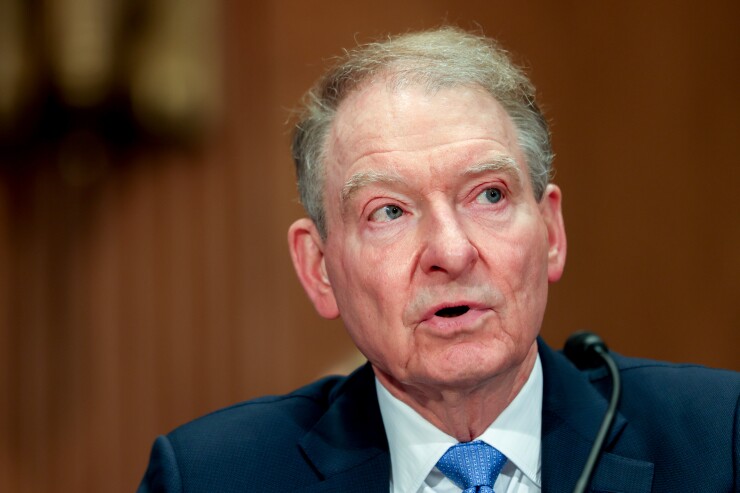President Donald Trump's first 100 days in his second term left municipal markets in a state of flux, issuers fearing the death of the tax exemption and defending against a spate of lawsuits. Experts are wondering what will hit the bond industry next.
Public finance leaders have been working to
At the moment, the industry seems to have found a prominent ally in
"Tax-exempt municipal bonds have a proven track record of responsible, community-driven investment," the letter said. "They are a fiscally sound tool that enables state and local governments to meet the growing needs of their communities without increasing federal spending or burdening local taxpayers."
Read more:
More recently, numerous states have either independently or jointly filed lawsuits against the Trump administration over issues such as tariffs, diversity, equity and inclusion programs and more.
On April 16,
"President Trump's unlawful tariffs are wreaking chaos on California families, businesses, and our economy — driving up prices and threatening jobs," Newsom said in the suit. "We are standing up for American families who can't afford to let the chaos continue."
School funding has also been put in the administration's crosshairs, as the ongoing pullback from DEI programs becomes a battleground for officials and legislators.
State attorneys general from 19 states including California, New York and Massachusetts
These cases allege multi-billion dollar losses for the aggrieved parties, and similarly damaging impact to the public debt instruments tied to each.
Read more:
Below are insights into how the Trump administration's first 100 days have impacted the municipal finance space and what experts are doing to adjust to these challenges.

Trump puts highway funding in middle of congestion pricing fight
Transportation Secretary
In his
"The federal government sends billions to New York — but we won't foot the bill if Governor Hochul continues to implement an illegal toll to backfill the budget of New York's failing transit system," Duffy said in a statement on April 21. "We are giving New York one last chance to turn back or prove their actions are not illegal."
Read more:

Trump administration faces lawsuits over school funding clawbacks
Sixteen states including California and New York have banded together in a
The legal effort filed against the U.S. Department of Education in U.S. District Court for the Southern District of New York aims to address the fallout from McMahon's March 28 letter, wherein she stated that the government would not stand by the extension of COVID-19 relief grants. Analysts with Moody's Ratings have stated the
"With each step President Trump takes to dismantle the Education Department, he is throwing our schools into turmoil and jeopardizing the academic success of a generation of American children," Rob Bonta, California attorney general, said
Read more:

Trump appointee Paul Atkins gets Senate nod to lead the SEC
Paul Atkins, founder and chief executive officer of Patomak Global Partners LLC, was confirmed as the next head of the Securities and Exchange Commission in a 52 to 44 vote in April. Atkins, who founded his strategy, risk management and compliance consulting firm in 2009, was previously an SEC commissioner from 2002 to 2008."MSRB congratulates Chair Atkins on his confirmation and looks forward to partnering with him to advance our shared regulatory priorities on strengthening the municipal securities market and fostering innovation, competition and capital formation," Mark Kim, Municipal Securities Rulemaking Board CEO, said in an April 10 statement obtained by The Bond Buyer.
Read more:

Tariff woes plague state and local pension funds
The top 25 state and local pension funds have seen public equity investments erode by roughly a quarter of a trillion dollars this year, with Trump's on again, off again stance on tariffs accounting for roughly $169 billion lost in the four days following the April 2 announcement.
Similar conclusions drawn by experts with Equable Institute, an independent non-profit research organization focused on public-sector retirement systems, offers a startling prediction into what might happen if pension funds are unable to recover from losses in the near term.
"There really are two things that bond investors will probably pay attention to," Anthony Randazzo, executive director of the Equable Institute, told The Bond Buyer. "One is to the degree that these investment losses lead to increases in required pension contribution rates over the next few years, that's going to put pressure on state and local budgets."
Read more:

Joint budget blueprint passes House of Representatives
House Speaker Mike Johnson, R-La. and Senate Majority Leader John Thune, R-S.D., successfully passed Trump's budget resolution on April 10, offering hopes for renewing the Tax Cuts and Jobs Act of 2017.
The resolution passed by a razor-thin margin of 216-214, as Johnson and Thune touted further cuts amounting to a minimum of $1.5 trillion during debates over the reconciliation bill. It's these cuts to prolong the TCJA that have
"And I can tell you that many of us are going to aim much higher," Johnson said during a press conference. "We want to make the government more efficient, effective and leaner for the American people."
Read more:





